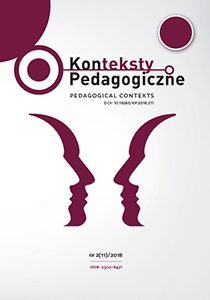Abstrakt
Gry komputerowe stanowią istotny obszar kultury nowych me-diów. W ostatnim czasie prezentowane są badania skupiające się na pozytywnym wpływie gier komputerowych na rozwój poznawczy oraz osobowościowy. Zmie-nia się ponadto dominująca narracja badaczy, gry komputerowe nie są omawiane już głównie przez pryzmat uzależnień behawioralnych.Celem artykułu jest prezentacja wyników badań obejmujących wpływ gier komputerowych na funkcjonowanie psychospołeczne dzieci oraz dorosłych.
Bibliografia
Ballard, M.E. i Welch, K.M. (2017). Virtual warfare. Cyberbullying and cyber-victim-ization in MMOG play. Games and Culture, 12(5), 466–491.
Collister, L.B. (2014). Surveillance and community. Language policing and empower-ment in a World of Warcraft guild. Surveillance & Society, 12(3), 337–348.
Ferguson, C.J. i Kilburn, J. (2010). Much ado about nothing. The misestimation and over interpretation of violent video game effects in Eastern and Western nations. Psychological Bulletin, 136(2), 174–178.
Gates, G. (2011). How many people are lesbian, gay, bisexual and transgender?, www.wil-liamsinstitute.law.ucla.edu [dostęp: 21.08.2015].
Granic, I., Lobel, A. i Engels, R.C. (2014). The benefits of playing video games. Ameri-can Psychologist, 69(1), 66.
Griffiths, M.D. (2002). The educational benefits of videogames. Education and Health, 20(3), 47–51.
Kelley, J.B. (2012). Gay naming in online gaming. Names, 60(4), 193–200.
Konarska, U. (2016). Zostań lesbijką/gejem na kilka godzin, czyli w jaki sposób gry przedstawiają związki nieheteronormatywne. Referat zaprezentowany na Konferen-cji Naukowej: Małżeństwo i rodzina w ujęciu antropologii kulturowej. Perspektywa empiryczna. Wrocław 2016.
Kovess-Masfety, V., Keyes, K.M., Hamilton, A., Hanson, G., Bitfoi, A., Golitz, D., Koç, C., Kuijpers, R.C.W.M., Lesinskiene, S., Mihova, Z., Otten, R., Fermani-an, C. i Pez, O. (2016). Is time spent playing video games associated with mental health, cognitive and social skills in young children? Social Psychiatry and Psychiatric Epidemiology, 51(3), 349–357.
Krobová, T., Moravec, O. i Švelch, J. (2015). Dressing Commander Shepard in pink. Queer playing in a heteronormative game culture. Cyberpsychology: Journal of Psy-chosocial Research on Cyberspace, 9(3).
Pisula, W. i Oniszczenko, W. (2008). Uwarunkowania genetyczne i środowiskowe ujawniające się w różnicach indywidualnych. W: J. Strelau i D. Doliński (red.), Psy-chologia. Podręcznik akademicki,t. 1 (s. 327–338). Gdańsk: Gdańskie Wydawnictwo Psychologiczne.
Przybylski, A.K. (2014). Electronic Gaming and Psychosocial Adjustment. Pediatrics, 134(3), 1–7.
Redakcja gry-online.pl. „Adamus”. World of Warcraft – recenzja gry, http://www.gry-online.pl [dostęp: 21.05.2016].
Redakcja gry-online.pl. „Kwiść”. Recenzja gry Dragon Age: Inkwizycja – najlepsze RPG od czasu Skyrima, www.gryonline.pl [dostęp: 21.05.2016].
Redakcja gry-online.pl. „Stranger”. The Sims 2 – recenzja gry, www.gry-online.pl [dostęp: 21.05.2016].
Shaw, A. (2015). Gaming at the Edge. Minneapolis–London: University of Minnesota Press.
Sundén, J. i Sveningsson, M. (2012). Gender and sexuality in online game cultures. Pas-sionate play. New York: Routledge.
Autor zgodnie z zaleceniem MNiSW, by przeciwdziałać praktykom „ghostwriting” i „guest authorship” składając tekst dołącza oświadczenie Autora/Autorów, w którym deklaruje wkład każdego z Autorów w powstawanie publikacji. Własnoręcznie podpisane oświadczenie należy przesłać na adres redakcji:
Joanna Skibska | w formie skanu przesłać poprzez system OJS (biblioteka wydawcy).
Autorzy nie ponoszą żadnych kosztów w związku z publikacją artykułu na łamach czasopisma Konteksty Pedagogiczne oraz nie otrzymują gratyfikacji finansowej za opublikowanie tekstu. Redakcja zastrzega sobie prawo do wprowadzania niewielkich zmian w artykułach, które nie mają wpływu na merytoryczną stronę publikacji.
Autor (Autorzy) artykułu oświadcza, że przesłane opracowanie nie narusza praw autorskich osób trzecich. Wyraża zgodę na poddanie artykułu procedurze recenzji oraz dokonanie zmian redakcyjnych. Przenosi nieodpłatnie na Wydawnictwo Libron autorskie prawa majątkowe do utworu na polach eksploatacji wymienionych w art. 50 Ustawy z dnia 4 lutego 1994 r. o prawie autorskim i prawach pokrewnych – pod warunkiem, że praca została zaakceptowana do publikacji i opublikowana.
Wydawnictwo Libron posiada autorskie prawa majątkowe do wszystkich treści czasopisma. Zamieszczenie tekstu artykuły w repozytorium, na stronie domowej autora lub na innej stronie jest dozwolone o ile nie wiąże się z pozyskiwaniem korzyści majątkowych, a tekst wyposażony będzie w informacje źródłowe (w tym również tytuł, rok, numer i adres internetowy czasopisma).
Tekst jest udostępniany w internecie na licencji CC-BY-SA

